Full disclosure: I formulate and sell supplements specifically for thyroid patients.
You should know that even though I sell supplements, doesn’t mean that what I am sharing here is false. In fact, I probably have a lot more experience with thyroid supplements compared to most people.
But, it’s also fair to say that I’m a little biased because of this.
I’ve seen so much misinformation and straight-up incorrect information floating around about thyroid supplements that I have to address them.
Why?
It’s simple:
This bad information may cause thyroid patients to avoid therapies that can actually be helpful and that’s the last thing I want.
I’ve been treating thyroid patients for 5+ years and my supplements have been used by over 30,000 thyroid patients to date.
I’m only sharing these numbers to let you know that I have seen quite a bit and I have a solid understanding of what types of things confuse thyroid patients, how they react to thyroid supplements, and what actually works.
Today we are going to talk about just that…
I’m going to address:
- Why many myths about thyroid supplements are simply incorrect
- Why your doctor knows very little about thyroid supplements despite having a strong opinion of them
- 5 common myths that are shared by your doctor and why they are all incorrect or wrong
- Why thyroid supplements may actually benefit your body in a big way
Let’s jump in…
Most doctors are clueless when it comes to supplements and vitamins and the thyroid is no exception
“They just don’t work”.
This was a phrase uttered by one of my attending physicians while I was in training in residency and she was referring to supplements.
It shocked me because I was personally using many supplements like fish oil, pre work out supplements, and even adrenal supplements at the time.
And I know that they were working for me because I FELT a difference.
But what shocked me about her statement was not that she said it but that she said it with so much confidence.
And her statement echoes the feelings of practically every other doctor out there.
Endocrinologists, especially, do not believe that thyroid supplements work at all.
You would think that they came to this conclusion from a deep understanding of thyroid physiology, a personal experience in using thyroid supplements with their patients and seeing outcomes, and a deep and continuous look at the scientific literature.
But you would be 100% wrong.
Instead, the reason that doctors claim that supplements don’t work is because that’s what they were taught.
And yet, they have virtually no clue how these supplements work, what they are doing in the body, or how they may be beneficial.
But this doesn’t stop them from giving you their opinion and stating it as fact!
There are a few simple tests you can use to see if your doctor actually knows anything about vitamins/supplements:
- Question: Ask your doctor what the best form of Vitamin D is if you want to increase your Vitamin D levels.
- Answer to look for: They should say Vitamin D3 (if they say D2 they are about 30 years behind the times)
- Question: Ask your doctor how to test for Vitamin B12 deficiency.
- Answer to look for: If they say serum B12 then they forgot basic first-year medical school classes. The answer is methylmalonic acid (1).
These are the most basic questions that you can ask and are akin to asking a mechanic if they know how to change the oil in your car.
If they don’t know the answers to these basic questions then there is no way you should trust them on their opinion of more advanced topics just like you wouldn’t let a mechanic who can’t change oil replace your entire engine.
5 common thyroid supplement myths that need to be debunked
By the time we are done, I think you will have a new appreciation for how supplements can be effective and why your doctor is probably not as smart as they want you to think…
Myth #1. Thyroid supplements contain thyroid hormones.
One of the more frustrating myths stated about thyroid supplements is that they contain thyroid hormones.
And while this myth has some truth to it, it’s not a common occurrence and it’s something that is actually illegal in the United States.
This concern stems from a study that was done years ago (2) which tested very low-quality supplements from big box stores that showed some of these supplements do contain small amounts of thyroid hormones.
But this study was done years ago and it was done on low-quality supplements that were not third-party tested or manufactured in GMP compliant facilities.
It simply isn’t fair to take an isolated study and claim that all thyroid supplements are harmful just because there are a few bad supplement companies out there.
I should also point out that it is illegal to include active thyroid hormones such as T3 and T4 into thyroid supplement formulations.
So anyone caught doing this would be in big trouble with the FDA.
By law, thyroid supplements can NOT contain active thyroid hormones because they would no longer be considered thyroid supplements at that point, they would instead be classified as thyroid medications that require FDA approval.
Do not fall for the lie that ALL thyroid supplements contain active thyroid hormones because it’s simply not true.
Reputable supplement companies will third party test and verify each lot of supplements to ensure that they do NOT contain active thyroid hormones and to ensure that the ingredients in the capsules match the ingredients on the bottle (this is standard practice).
Myth #2. Thyroid supplements contain iodine.
So?
That’s pretty much the only response I have to this statement.
While it isn’t a myth (because it’s often true), it’s certainly not a problem.
And if any doctor (or anyone) throws out this accusation all you have to do is lay down a couple of important facts about iodine:
Fact #1. Iodine is REQUIRED in the human body to create T3 and T4 thyroid hormone.
Fact #2. Humans have no way to CREATE iodine.
Fact #3. Humans MUST get iodine from either their diet or from supplements.
Fact #4. Iodine is REQUIRED for all humans including those with thyroid problems for the reasons listed above.
If you want to suggest that iodine is somehow harmful to thyroid patients then you have to explain to me why thyroid patients are exempt from human physiology which states that humans can NOT create iodine even though it is required for life.
The fact that iodine is required for life is well known and there are many scientists who constantly struggle with how early humanoids were able to survive without an obvious source of iodine in their lives/diets.
The idea that iodine is dangerous stems from some studies which occurred in the early 2000s that showed populations of people that consume higher doses of iodine have a higher incidence of Hashimoto’s.
Doctors took this information and made the connection in their brains that iodine MUST cause thyroid problems.

But these doctors forgot that correlation does not equal causation and numerous studies have come out since which elaborate on this connection.
High iodine intake in people who are deficient in nutrients like selenium as the potential to cause problems but this potential problem can be mitigated by supplementing with selenium.
You will find that almost all of my supplements that contain iodine also contain selenium for this reason.
Myth #3. Some thyroid supplements contain cow glandulars
This isn’t a myth so much as a scare tactic.
Why?
Because your doctor will try to tell you that consuming bovine (or cow) products will increase your risk of developing mad cow disease or bovine spongiform encephalopathy (3).
Mad cow disease is a disease found in cows that is transmissible to humans if they consume brains from a cow that is infected.
It sounds terrible, right?
Too bad there has NEVER been a reported case of BSE in humans caused by over-the-counter supplements.
In fact, the disease is so rare that there are very few case reports period.
But this doesn’t stop your doctor from talking about it and freaking you out.
In reality, you would have a higher chance of getting hit by lightning 6x in a row than you would acquiring BSE from thyroid supplements.
Here’s why you shouldn’t worry about BSE in thyroid supplements:
#1. BSE is only found in the brain of cows, which means you must consume the BRAIN or PITUITARY gland of the cow to get it.
#2. There has never been a reported case of BSE from over-the-counter supplements.
#3. Supplements which contain glandulars from cows come from countries that have never had a case of BSE (usually Argentina or New Zealand).
#4. EVERY lot of glandulars is third party tested and verified to ensure that they do NOT have pathogens.
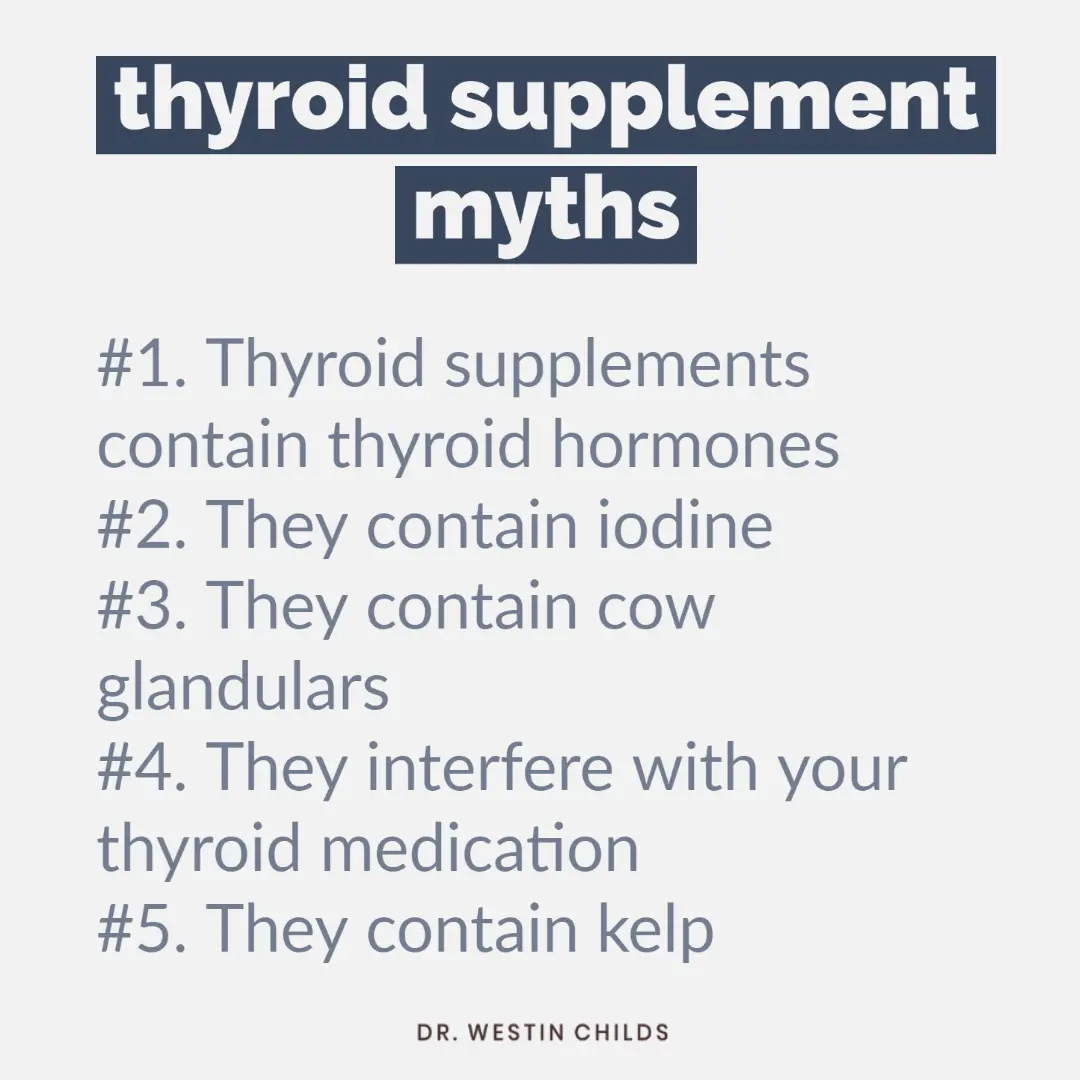
If this wasn’t enough, most thyroid supplements do not even contain thyroid glandulars!
And if they do, you can easily check for that by looking at the ingredients.
I personally have several thyroid supplements which DO NOT contain thyroid glandulars and one thyroid supplement which DOES.
If you wanted to avoid thyroid glandulars, for whatever reason (usually religious reasons in my experience), then you can still take thyroid support supplements which do NOT contain them.
So avoiding ALL thyroid supplements, for this reason, would just be silly.
This myth is something that may give you nightmares but it’s not a real or serious problem that you should worry about.
Myth #4. Thyroid supplements interfere with your actual thyroid medication
This myth goes something like this:
“Well, you can take a thyroid supplement and it may actually work but it will interfere with your thyroid medication and that’s bad!”
What your doctor is really saying is this:
Taking thyroid supplements will make you feel better and will make my job harder because then I may have to adjust your thyroid medication.
Your doctor may act like this is a bad thing but is it?
Is it a bad thing if you take supplements that naturally improve your OWN thyroid gland function which then causes you to be LESS reliant on thyroid medication?
I wouldn’t call that a loss. I would call that a major win.
In fact, the entire goal, as far as I am concerned, is to try and help the body get back to “normal” so that you don’t HAVE to take prescription medications at all.
This, for whatever reason, is often viewed as a bad thing by your doctor.
They would rather you stay on a prescribed thyroid hormone for the rest of your life:
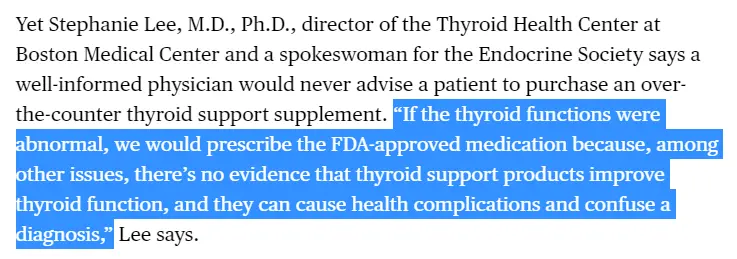
If you want to stay on thyroid medication for the rest of your life, then by all means avoid taking any thyroid supplements.
If you choose to use thyroid supplements then don’t worry about the positive effect that they may have on your thyroid gland which may require some adjustments to your medication (often downward).
This is just a little bit of extra work for your doctor but a great benefit to YOUR body.
Myth #5. Thyroid supplements contain kelp
This isn’t a myth so much as another “So what?”.
And it actually makes no sense if you see myth #2.
Let me break it down:
Your doctor doesn’t want you to use thyroid supplements because they are bad and can contain iodine.
They also don’t want you to use thyroid supplements because they contain kelp and that’s bad.
The reason they don’t want you to consume kelp?
Because you can get enough iodine naturally in your diet (you can’t, actually, but we will talk about that in a minute).
Except, isn’t kelp one of the main ways that people get iodine from their diet?
What’s the difference between eating seaweed and supplementing with a capsule that contains crushed up seaweed?
Nothing.
This is the crazy double talk that comes out of doctors when it comes to the thyroid.
But let’s go back to the primary reason that doctors don’t want you to take thyroid supplements with kelp:
Because they believe that you can get enough iodine from your diet.
But is this actually true?
Not really.
Decades of research suggest that Americans continually do NOT get enough iodine in their diet (4).
On top of that, certain populations such as pregnant women and lactating women (5) do not get enough iodine either despite it being MORE important for them than the regular population.
To simultaneously suggest that kelp is harmful because it’s in a supplement and that you can get enough iodine from your diet is incorrect on both counts and shows just how little you understand about thyroid physiology.
To top it off, not all thyroid supplements even contain kelp!
Out of the 15+ thyroid supplements I carry, only one has kelp and I just recently added it.
And, as an aside, it has glowing reviews from people who have used it!
Final Thoughts
I’m not trying to push you into using thyroid supplements but I do want you to have the knowledge you need to make an INFORMED decision.
If you listen and trust what your doctor is saying you are getting a seriously uninformed opinion on the subject.
I cringe every time I hear someone tell me that their doctor told them not to do something or not to take something.
My only question to these people is this:
“Has the advice of your doctor actually worked for you in the past?”
If it did, why are you reading articles about how to naturally improve your thyroid? If your doctor was doing their job you wouldn’t need to go looking for additional information on how to feel better.
And, if your doctor hasn’t helped you in the past why are you continuing to trust their opinion?
Just some food for thought!
At the end of the day, you are the one who cares more about how you feel than anyone else.
Don’t let your doctor decide how you feel.
Now I want to hear from you:
Did any of these myths surprise you?
Were you aware of them or is this your first time being introduced to them?
Has your doctor tried to use any of these myths on you?
Are you taking thyroid supplements and feeling better?
Leave your questions or comments below!
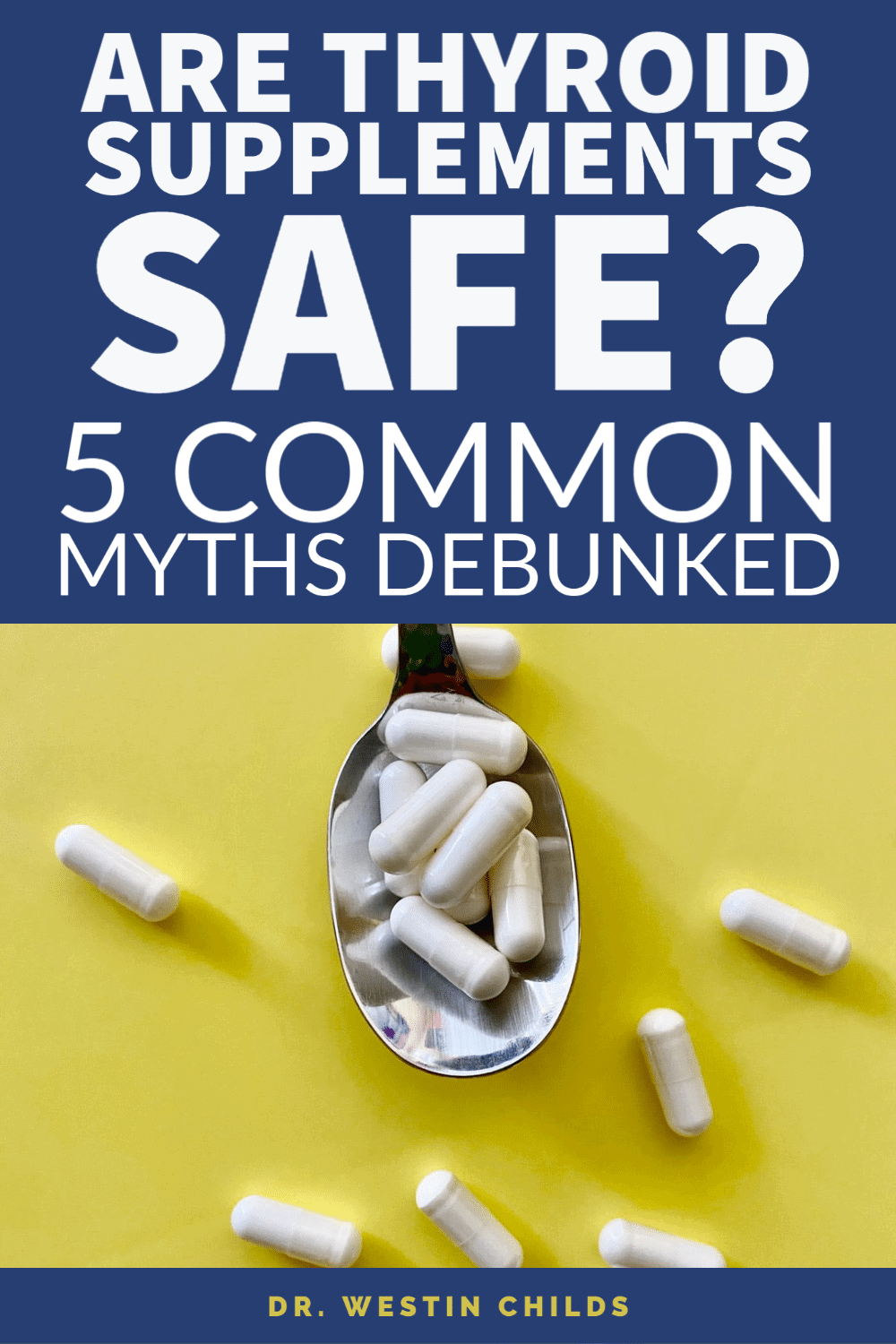
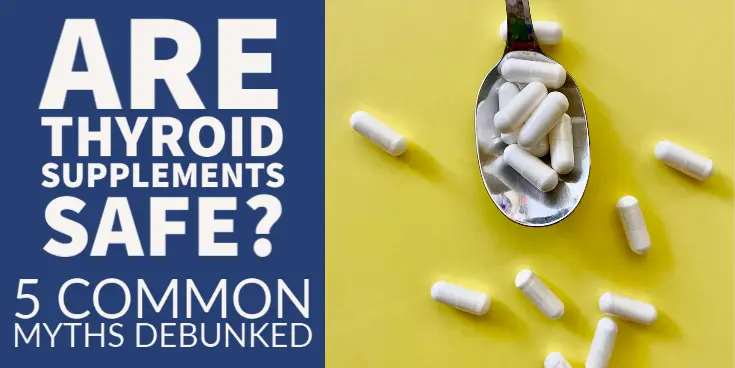
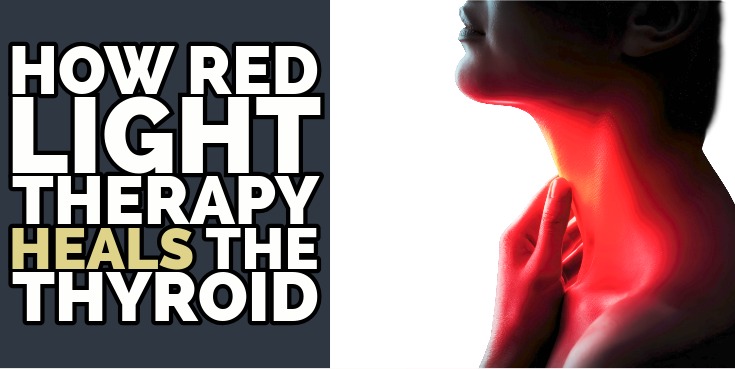
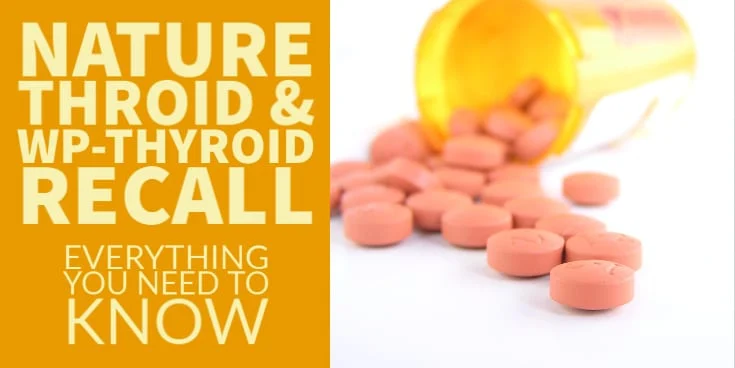
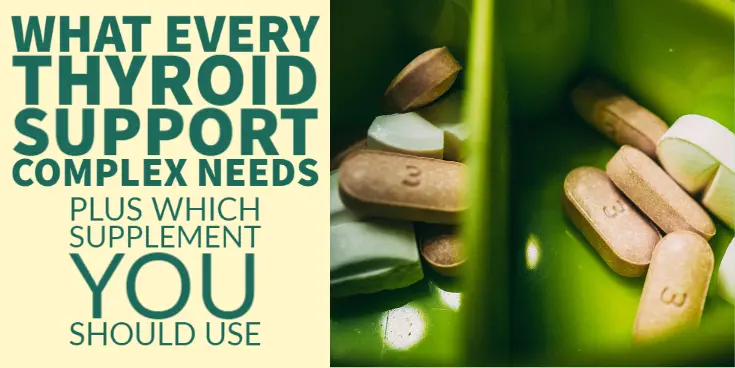
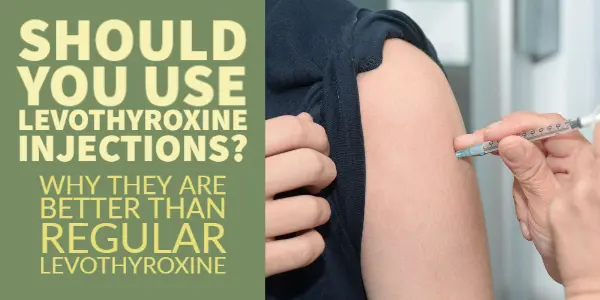
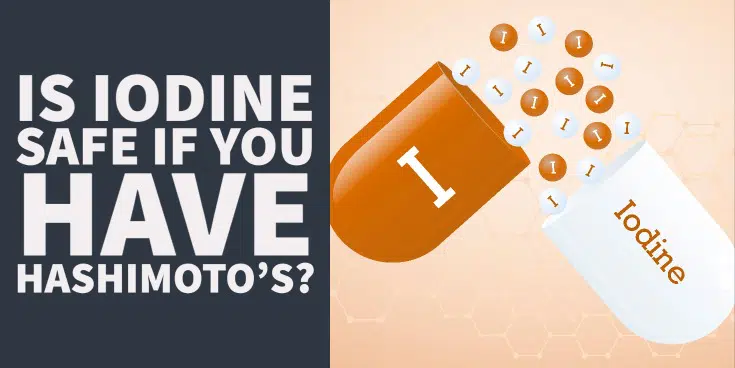
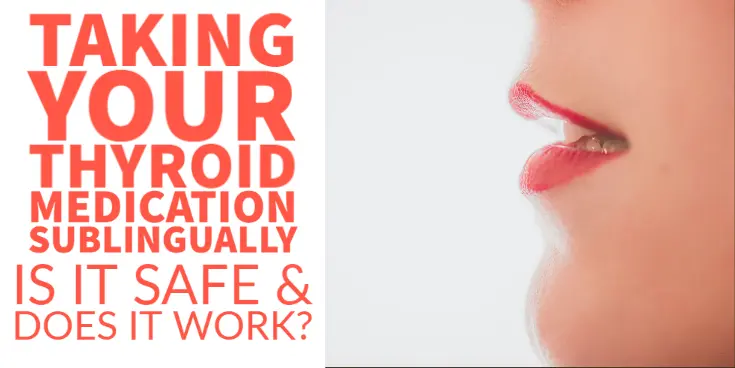

Greetings,
I was wondering if your Leptin Resistance Rx is safe during breastfeeding?
Thank You
Hi Erah,
Yes, it is 🙂
Thanks from someone who has taken thyroid supplements (and no prescription medication) for a decade. Most bizarre is the idea that kelp is something bad?!? And speaking of iodine, doesn’t chlorine in drinking water and fluoride in water and toothpaste interfere with iodine absorption? I would think that would be another reason to supplement iodine, but I’m not sure.
Hi Miriam, as someone who aced Chemistry I can tell you Cl and F displace can displace iodine. Chlorine and Fluorine are more electronegative (aggressive) than iodine.
Dr Browstein says the same and recommends high dose Iodine to compensate. Dr Broada O Barnes talked about using NDT back in the 70s when big pharma started pushing T4. So throughout human history seaweed and glandulars have been used theraputically. Finally, out of the iodine in your body only 40% is in the thyroid. The remaining 60% is held by the rest of the body, primarily immune and endocrine systems.
Hi Mariam,
Mark is correct. The idea is that chloride, bromide, and fluoride look similar enough to iodine from an electromagnetic perspective that they displace iodine on thyroid hormone molecules. If this happens then those thyroid hormone compounds become less biologically active (or completely inactive) in which case you will feel hypothyroid. You can beat this effect by simply outcompeting by taking higher doses of iodine. Alternatively, you can also attempt to detoxify these halides out of your body which reduces competition for binding.
Great article and I totally agree! Thank you for doing so much for people suffering from Thyroid. I am learning and understanding so much about Thyroid from you.
Hi Reeta,
Happy to help!
My doctor will not even address my very marginal (low) T3 or the conversion of T4 to T3. He will not consider boosting the T3 with any medication even though many of my hypothyroidism symptoms persist. He only focuses on TSH and since raising my Levothyroxine from .88mg to 1mg to 1.12mg over the course of about 1 year and little relief, I told him I was going to supplements of some kind. Well, he didn’t even respond to that. Since I started your T4 to T3 Conversion Booster I have seen subtle improvements in the first 2-3 weeks and look forward to even better signs. I will see my labs in about 3 months and I’m hoping to see the verified improvement there too. Thanks Doc! Your D3 and Booster supplements have helped to improve my health and livelihood! RonB
Hi Ron,
Glad to hear they are helping!
Hi and thank you doctor Childs.
I want to get off Armour thyroid for hashis. How much kelp powder or mg can I use daily to slowly get off of the armour? I also try to lower inflammation with diet and herbs. Doc says my thyroid hardly working but I have faith thatgod created it to work and that I can get it to work again if I give it iodine and lower the pig hormone right?
Why doc Alan Christiansen say we get too much io? I think due to too much iodized salt perhaps and not from natures whole io foods such as kelp? My training as an herbalist says that as long as one ingests a whole food, one is safe or the whole part of an herb etc. So…. if one ingests io from seaweed then it should be safe,right?
i wanted to ask about what dr christiansen says about iodine too..
Does your Glandular+ affect tsh?
I have historically had a low TSH for years and years. I have graves and my last round on ATD’s was not successful so we decided to do a total thyroidectomy a couple years ago. Since then my tsh has always been low. At first it was super low but has slowly been climbing. However my endo is always so concerned with a low tsh and has now said he wants be to drop my dose even more which I feel great on the dose I’m on 112mg synthroid 5 days 100mg synthroid 2 days. Latest tsh was .193. FT3 was 2.12 and FT4 is .91. I don’t get why he wants me to drop when my tsh is slowly improving. Went from .006 18 months ago and has slowly been climbing since on this same dose. So my fear is my T3 and T4 will drop with my lowering my dose.
So I’m wondering if your supplement will help improve my t3 and t4 without making my tsh any lower than it is. I’m super interested to try it but I don’t want to lower my tsh any more!
Thank you!
Hi – I am one of those post menopause women, somewhat ignorant who went along to the doc and ended up tested with the result…Eltroxin. after that my shock…high cholesterol. Then high blood pressure.
That’s where I sit, month after month swallowing tablets everyday which I absolutely hate.
I used to weigh 64kg and went to 80kg and doesn’t matter what I eat or how much I hike or walk there I stay. Well I am used to this weight now at 67 but why, why, must I swallow statins and BP as well. And in fact why am I seemingly doomed to swallow Eltroxin.
Or am I being difficult?
My mom is 89 and she still to this day is not on a single tablet.
Regards Melody
Ps. I regard myself as one of those “I am fit and healthy types and I have no time for labels of being ill” people.
When I refused statins my doc frightened me with a possible “stroke.”
Feel miserable
Does that mean that it’s good even for us suffering from Hashimmoto’s disease to eat kelp? I’ve eaten it for several years before I heard it was supposedly bad for us with autoimmune disease. Then i stopped. Should I add it again?
Hi Charlotta,
Most people with Hashimoto’s do very well on iodine. I would recommend reading this article for more information on that topic: https://www.restartmed.com/hashimotos-iodine/
Hi Dr Westin i had a thyroidectomy almost 4 years ago and have been Eltroxin since. I put on weight even when i exercised and ate clean. I only started taking supplements a month ago and have dropped 7kg and feel a lot lighter and energetic . My question is without a thyroid i am forced to take prescription medicine.
Hi Tee,
Yes. If you do not have a thyroid you must take thyroid medication forever.
Last year my hyperthyroidism started and it was an awful experience, I was on 30mg Carbimazole and since January my Dr. changed it to 15mg – I do not mind talking about this.
Yes I feel so much better even with the reduced dosage. I lost a lot of weight last year (size 14 UK – bone thin). So far my appetite has increased and I am eating well but I research a bit a know that I need to take supplements to help my body with the healing process – I have been taking Dr. W. Childs Thyroid daily essentials, its convenient to have everything in 1 pack and I feel good that the supplement targets thyroid health, in a nut shell I feel good and I am gradually gaining weight even though I wish it could be faster.
My question is; am I correct that I have to be on these supplements for 3 months then stop for a while and then continue again? Also, Is this pack the only supplement I should be taking for my thyroid health ?or please recommend. I might add that I take 1 capsule of a well woman formula.
I am on an 18month treatment plan for my thyroid.
Hi Cassandra,
There is no need to stop taking supplements every 3 months as you suggested. In fact, it’s often better to stay on them continuously. And no, you can definitely take additional supplements! I would take a look at these which would be ideal for your situation: https://www.restartmed.com/product/hyperthyroid-bundle/
Thank you so much Doctor, I will heed this advice.
Kindest regards
Hi Dr Childs,
Thank you for sharing wealth of knowledge. I have some questions, how to decide which supplement will be good for an individual. , For example: I am Thyronorm 125 MCG for past 4 years+, my TSH was in high range and after that I was put on this, my weight has increased by 25 KG in the past 6 years, I am unable to lose weight despite walking/running and having a control diet. I have tried various supplements, I am continuously taking some supplements like Fish Oil, Thyromax etc. My TSH, T3, T4, FT3, FT4 are always in normal range though.
Hi Dr. Westin Childs,
I read most of your articles and videos. I trust you and follow your words. I have hashimoto’s desease. Now I am very healthy and do not take any medicine.
I ate little and was 117 lbs. Now I eat a lot of “healthy” foods and I am 107 lbs. I was almost frozen in winter, but now I am energetic. My heart beat normally, headache disappear, face become symmetrical again (I guess the disease change the facial bone temporarily), bad mood disappear, toes are not numb or pain, eye pain disappear. I feel life is so good now.
I want to let you you know I thank you very much, Dr. Westin Childs. You helped a lots of patients. Hope your words can help more people in the future.
Thanks and Best,
Yu
Hi Yu,
I’m glad you are doing so much better! It sounds like your healthy diet is helping quite a bit 🙂
I agree with your comments and research Dr. Child’s. However, re iodine I am allergic to it. So it seems a catch 22 for me. I have hashimotos and if I take iodine supplements I develop great fatigue and eventually a reaction akin to a shellfish allergy. Have you encountered this with your patients and what do you recommend to make up for the iodine deficiency then? Thanks for your help.
Hi Nicky,
I’m torn on the idea that people can be allergic to iodine. Iodine is required for life and is found in all sorts of foods including milk, eggs, bananas, and strawberries. Most people who say they have an allergy to iodine also consume these foods without any issue. I think it’s more likely that people who take iodine and experience reactions such as the one you experienced are having issues with halide detoxification as their body eliminates them. To me, it seems far more likely that this is the case as opposed to having a true allergy to something that is required to sustain life.
You can find the list of foods high in iodine here: https://www.restartmed.com/16-foods-with-iodine/
Hi Dr Childs,
Thank for the very informative article. I have couple of questions,
How to identify which supplement is good for our own thyroid condition? How to lose weight when having thyroid?
Thank you.
Rajesh
Hi Rajesh,
I have a list of supplements that can be used based on your thyroid condition here (it’s currently being updated): https://www.restartmed.com/supplement-guide/
You can also reach out to us via email at Email us: Click to view address and we can help you out 🙂
Thank you always for your informative articles! Can you explain why my SHBG is consistently high? I’ve had hypothyroid for years. Managed with Armour. Other hormones are in good range. Feel good other than some hair thinning. Would appreciate any feedback.
Hi Sophia,
Hard to say for sure without a lot more information but commonly birth control can cause that issue.
Hi Dr Childs,
Your articles have alot of insight & great advice which is difficult to obtain from the general medical community. With regards to supplements, often with Hashimotos Disease patients have an inflamed gut, so this substantially reduces the amount of nutrients, vitamin etc absorbed leading to some quite severe & serious deficiencies affecting the nervous & other body systems.If supplementation with vitamins were not available such patients would be extremely incapacitated.One endocrinologist told me not to take folic acid/folate tablets as it may cause cancer in higher doses, but this is the only supplement I’ve seen that treats tongue redness/soreness in Hasimotos disease almost immediately .
Hi M,
My advice is to avoid listening to doctors who make recommendations on vitamins while never actually checking basic vitamins in the blood such as Vitamin B12 or Vitamin D 🙂 If your doctor doesn’t know enough about the importance of these nutrients then all further advice is suspect.
I Was diagnosed with borderline hypothyroidism in the past and recently. From my perspective the only real symptoms is low brain energy & trouble thinking on my feet. I have experienced some improvement in energy and sense of well being since supplementing with iodine. My T3 and T4 have always been in the low end of the normal range but has improved with taking the Amour Thyroid medication. The Doctor’s &my big concern right now is my high TSH ranging from 7.5 to 13 (over several years). The doctor wants to keep it under 10. Is this high TSH necessarily a problem?
Hi Richard,
Over 10 is certainly a problem. I would recommend reading this article for more information: https://www.restartmed.com/tsh-levels-normal/